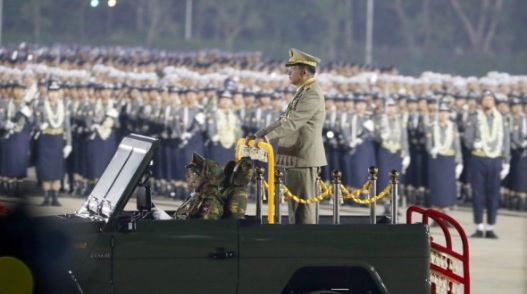(Prelims: Current Affairs of National and International Importance)
(Mains, General Studies Paper-2: India and its Neighbourhood Relations, Impact of Policies and Politics of Developed and Developing Countries on India's Interests) |
Context
Myanmar's military government has announced the end of the nationwide emergency imposed since the February 2021 coup. Also, general elections are being planned within six months.

Background
- The Myanmar military (Tatmadaw) overthrew the elected government led by Aung San Suu Kyi's National League for Democracy (NLD) in February 2021, alleging voting fraud.
- After this, an emergency was imposed in Myanmar, allowing the military to rule by order.
- Since then, the country has been witnessing widespread protests, violent repression and a civil war-like situation with ethnic armed groups.
Recent developments
- The National Defence and Security Council has announced that the state of emergency has officially ended.
- Government chief Min Aung Hlaing has indicated preparations for elections by early 2026.
- Political parties have been asked to register under a new election law drafted by the military.
Challenges
- Lack of political credibility: Many political observers and Western governments have expressed doubts about free and fair elections.
- Widespread conflict: Ethnic armed organizations and the parallel National Unity Government continue to oppose military rule.
- Opposition suppression: Hundreds of politicians, including Aung San Suu Kyi, are either in jail or disqualified.
Implications for India
Border security concerns
- The ongoing instability in Myanmar could increase cross-border insurgent activities in India's northeast, especially in Manipur, Nagaland and Mizoram.
- Northeast India's insurgent groups like NSCN-K and other armed groups have safe havens in Myanmar and can take advantage of the chaos.
Refugee inflow
- Thousands of refugees have already taken refuge in Mizoram and Manipur due to political violence and military action.
- India may face humanitarian and logistical challenges in controlling the influx of refugees in future.
Disruption in connectivity projects
- Projects like the Kaladan Multi-Modal Transit Transport Project and the India-Myanmar-Thailand (IMT) highway may get delayed due to insecurity.
- This hampers India's Act East policy and regional integration goals.
Strategic balance required
- India has to maintain diplomatic balance while promoting democratic values while negotiating with the junta for regional stability.
- It is imperative to avoid excessive dependence on the West or China for influence in Myanmar.
China's growing influence
- The political vacuum in Myanmar could provide an opportunity for China to expand its influence, especially through infrastructure projects and support to the military regime.
- It affects India's strategic interests in the Indo-Pacific region and the immediate neighbourhood.
ASEAN and regional diplomacy
- The crisis in Myanmar challenges the credibility of ASEAN, thereby affecting India's engagement with the grouping.
- India should coordinate with ASEAN, Japan and other countries to ensure a stable and democratic Myanmar.
Humanitarian and ethical dilemmas
- India's abstention from UN resolutions on Myanmar has been criticised.
- Balancing non-interference, national interest and democratic values is diplomatically sensitive.
